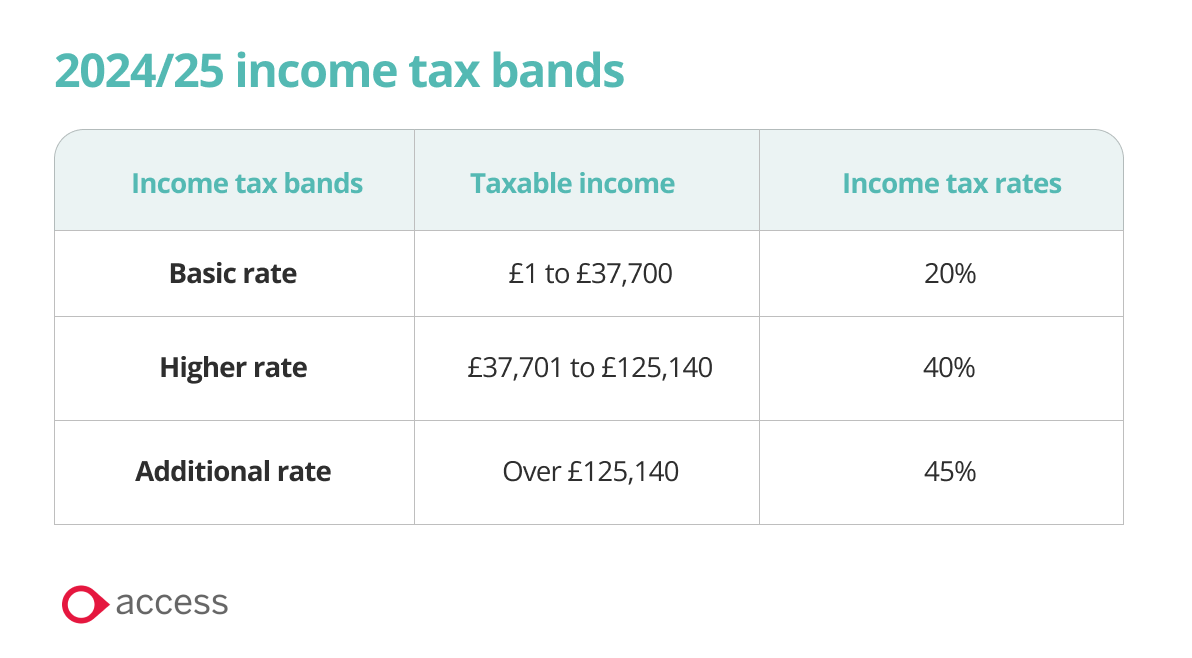
As we approach the new tax year of 2024/25, businesses in the UK are preparing for payroll year end. This means not only wrapping up everything for 2023/24 and issuing P60s to employees, but also keeping abreast of the latest legislative changes to payroll regulations that will be enforced from the start of the new tax year. This allows business owners and HR professionals to ensure that they are well equipped to tackle any changes and ensure that their current and ongoing payroll processes are legally compliant.
In this article, we explain the key updates relating to payroll so that business owners and HR professionals can run their payroll smoothly and legally. We'll cover things like tax code changes and new rates, giving you the information you need to stay on track.
What is payroll legislation?
Payroll legislation covers the policies and legal requirements set out by the government to ensure that all employers are paying their employees consistently and correctly. Compliance with payroll legislation is a legal requirement for employers, no matter how small or large the organisation.
Like any other type of laws and policies, those regulating payroll are regularly assessed and amended to ensure that they meet employees’ needs and reflect the current cost of living and tax rates. Staying up to date with the latest payroll legislation is essential, as making payroll errors can be costly and some organisations choose to use payroll outsourcing services to reduce the in-house burden. This is useful for small businesses with fewer resources, allowing HR teams to focus on other tasks. It’s also beneficial for large organisations with more complex payroll requirements.
Minimum wage and national living wage
From 1 April 2024, workers aged 21 and over will be entitled to the national living wage. This has been lowered from the current age of 23 years. For those aged 20 and below, the minimum wage will still apply.
You can see the comparison between the current rates and the new rates in the table below. 
Apprentice minimum wage
Similarly, apprentices are also legally entitled to a national minimum wage if they’re either aged 19 and under, or aged 19 or over and in the first year of their apprenticeship. Once they are 19 or over and have completed the first year of their apprenticeship, they are then entitled to the national minimum wage for their age.
The current apprenticeship rate is £5.28. From 1 April 2024, this will increase to £6.40.
GOV.UK’s national minimum wage and living wage calculator for employers can help you to find out if you’re paying a worker the correct national minimum or living wage, and whether you owe any payments due to underpayment.
Tax thresholds and allowances
Tax thresholds and allowances determine how much income individuals can earn before they must start paying tax. These limits reflect factors like inflation and changes in the economy, and several changes will come into effect for the 2024/25 tax year.
Employee Personal Allowance Rates for 2024
The personal allowance, also known as the tax-free allowance, is the amount of money an employee can earn before they start paying income tax. The standard employee personal allowance for England and Northern Ireland, Scotland, and Wales is currently £12,570 and will remain the same. In fact, it’s expected to be frozen at this amount until 2028.
Income tax
Income tax is the money taken from an employee’s earnings by the government to pay for public services. When an employer hires a new employee, they calculate their tax code using their P45 form from their previous job. Income tax is calculated based on how much a person earns, with different rates for different income levels.
Employees’ tax codes usually need updating at the start of each tax year. If HMRC changes the tax code during the year, they’ll email you to let you know about the change. It’s crucial to update payroll records with this information to make sure you’re paying your employees correctly.
For the 2024/25 tax year, the income tax bands remain the same as 2023/24, as detailed in the table below. Emergency Tax Codes for 2024
Emergency Tax Codes for 2024
For the 2024/25 tax year, the default code is 1257L. The type of pay is then added as a suffix, with W1 for weekly pay, M1 for monthly pay, and X for a non-standard pay period.
Changes to National Insurance Rates
In November 2023, Chancellor Jeremy Hunt announced changes to National Insurance rates for 2024. These changes came into effect in January 2024 and vary depending on whether a person is self-employed or employed. For class 1 employees, the main employee National Insurance (NI) rate dropped by 2%, meaning employees will keep more of their earnings after tax. For self-employed individuals, class 2 and class 4 National Insurance rates may also be affected, potentially resulting in changes to the amount they need to pay.
Statutory Pay Rates
Statutory pay rates are the minimum payments that employers are legally required to give their employees for specific situations, such as parental leave, sick leave or carer’s leave. These rates ensure that employees receive a certain level of financial support during periods when they’re unable to work. As they need to reflect the current economic conditions, they are also set to change for the upcoming tax year.
Statutory Parental Leave
Statutory parental leave allows employees to take time off work to care for their newborn or newly adopted child. It’s designed to support parents in caring for and bonding with their children during the early stages of their lives, and can be taken by either parent.
Starting from 7 April 2024, all statutory parental rates will increase, and will be payable for the full statutory week falling on or after this date. They will increase from their current rate of £151.20 per week to £159.23 per week. This includes Maternity Pay (SMP), Paternity Pay (SPP), Shared Parental Pay (ShPP), Statutory Bereavement Leave (SBP), and Statutory Adoption Pay (SAP).
What is Statutory Sick Pay (SSP) in the UK?
Statutory sick pay (SSP) is the money paid by employers to employees who are too ill to work. This helps to ensure that they will still be able to meet their financial obligations if they are unable to work for an extended period of time. It’s paid for up to 28 weeks, after which time any further leave is unpaid. Statutory Sick Pay
shouldn’t be confused with occupational sick pay.
The SSP rate is set to increase in April 2024 from £109.40 per week to £116.75 per week, providing better financial stability for employees as the cost of living continues to rise.
Carers Leave
From 6th April 2024, a new carer’s leave entitlement will come into effect. This allows employees to take time off work without fear of losing their job if they need to provide or arrange care for a dependant with a disability, care needs due to their old age, or a physical or mental illness or injury that is expected to require more than 3 months’ care.
Employees can take up to one week of leave every 12 months, where a ‘week’ refers to the length of time they normally work over 7 days. For example, an employee who usually work 3 days per week can take up to 3 days’ carer’s leave every 12 months. While this leave is unpaid, it’s a significant step towards supporting individuals who have caring responsibilities, helping them to better balance work and caregiving responsibilities.
Paid Leave and Holiday Entitlement
In the UK, statutory holiday entitlement ensures that employees are entitled to a certain number of weeks of paid leave each year. For leave years beginning on or after 1 April 2024, full-time employees will be entitled to a minimum of 5.6 weeks of paid leave, calculated according to actual hours worked using the 12.07% accrual method. From this date, part-time workers will receive a pro-rata entitlement based on the hours they work. You can use GOV.UK’s holiday entitlement calculator to figure out exactly how much leave an employee is entitled to.
Additionally, as of 1 April 2024, rolled-up holiday pay will become lawful for zero-hour contract workers, marking a change in previous legislation where this practice was previously deemed unlawful. Rolled-up holiday pay is a method where holiday pay is calculated and paid as part of an employee’s regular wages, rather than providing paid time off when they take holiday.
Payroll legislation: Preparing for the new tax year
Payroll encompasses a wide range of tasks and responsibilities, including ensuring compliance with the ever-changing employment laws and legislation, and keeping on top of everything can be tough. This is particularly true as we approach payroll year end. To make sure you’ve got everything covered for payroll end on 5th April, take a look at our payroll year end checklist.
If you’re looking for outsourced payroll services, or you have any questions about our HR and payroll software, please get in touch and we’ll be happy to help.
